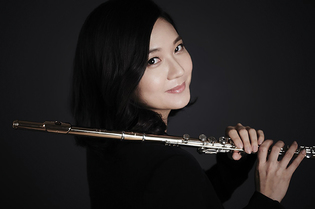
Yoobin Son
Flutist
By brin solomon ’14
Yoobin Son ’09MusM wasn’t supposed to play the flute. “My mom actually started playing the flute first,” related Son, who plays with the acclaimed New York Philharmonic. “But then she started getting really dizzy and decided she couldn’t play it anymore. I was nine years old at the time, and I’d seen someone playing the flute on TV and been mesmerized by the sound and how beautiful it looked, so I asked Mom if I could take her lessons.” Her mom said yes, and Son was soon learning the instrument.
After her initial studies in Korea—encouraged by her grandfather, Seog Woo Son, himself a Korean pop songwriter—Son came to the United States to pursue an undergraduate degree at the highly selective Curtis Institute of Music. She followed it with a master’s at Yale. “Being at the university was really eye-opening,” she says. “Curtis is a very small school, which is a great environment for musicians, but I never really met anyone who wasn’t a musician.” In musical careers, the need for a narrow focus to hone technique often pulls against the need for a broad exposure to life. Son is glad she could learn in both environments.
But beyond the diversity of Yale’s student body, Son also remarked on the opportunities afforded by the experience of her instructors and the university’s position in New Haven. She auditioned into the New Haven Symphony Orchestra in her second year, her first professional experience and a critical stepping stone on her path to the Philharmonic. Her teacher, Ransom Wilson, is a conductor as well as a flutist and gave her a unique perspective on the repertoire she was working on.
Even as a student, Son knew she wanted to stay in the country and pursue an orchestral career, so she began taking professional auditions even before she had graduated. “I always loved the symphonic repertoire, and I loved working with people,” she says. Some musicians dream of specific ensembles, but Son knew she had to be flexible. “As a flutist, you can’t really pick and choose; if there’s an audition, you have to take it. I honestly never even thought I’d be playing in the New York Philharmonic one day, but, you know, it worked out!”
Or at least it worked out until the coronavirus pandemic effectively called a halt to live performance. Son was already planning for big changes in her life; she and her husband, also a musician, had a child in July, four months into the lockdowns. “In a way it’s good timing,” she says ruefully. “I have plenty of time to focus on figuring out how to be a mom.” She’s cautiously optimistic that the tradition-bound classical music scene will embrace changes it’s been hesitant to accept in the past: “Until now, classical musicians were behind in their use of technology, but now we don’t have a choice. We have to adapt.” But she admits that much of the future is still uncertain. “We’ll just have to see what happens in the next few months, the next few years.”
 loading
loading